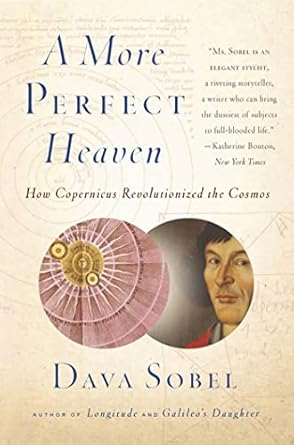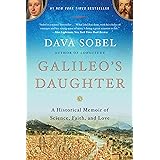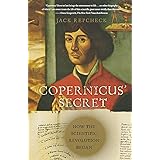
Download the free Kindle app and start reading Kindle books instantly on your smartphone, tablet, or computer - no Kindle device required.
Read instantly on your browser with Kindle for Web.
Using your mobile phone camera - scan the code below and download the Kindle app.

OK
 Audible sample Sample
Audible sample Sample 


A More Perfect Heaven: How Copernicus Revolutionized the Cosmos Paperback – October 16, 2012
By 1514, the reclusive cleric Nicolaus Copernicus had developed an initial outline of his heliocentric theory-in which he defied common sense and received wisdom to place the sun, and not the earth, at the center of our universe, and set the earth spinning among the other planets. Over the next two decades, Copernicus expanded his theory and compiled in secret a book-length manuscript that tantalized mathematicians and scientists throughout Europe. For fear of ridicule, he refused to publish.
In 1539, a young German mathematician, Georg Joachim Rheticus, drawn by rumors of a revolution to rival the religious upheaval of Martin Luther's Reformation, traveled to Poland to seek out Copernicus. Two years later, the Protestant youth took leave of his aging Catholic mentor and arranged to have Copernicus's manuscript published, in 1543, as De revolutionibus orbium coelestium (On the Revolutions of the Celestial Spheres)-the book that forever changed humankind's place in the universe.
In her elegant, compelling style, Dava Sobel chronicles, as nobody has, the conflicting personalities and extraordinary discoveries that shaped the Copernican Revolution. At the heart of the book is her play "And the Sun Stood Still," imagining Rheticus's struggle to convince Copernicus to let his manuscript see the light of day.
- Print length288 pages
- LanguageEnglish
- PublisherBloomsbury Publishing
- Publication dateOctober 16, 2012
- Dimensions5.42 x 0.8 x 8.31 inches
- ISBN-100802778941
- ISBN-13978-0802778949
The Amazon Book Review
Book recommendations, author interviews, editors' picks, and more. Read it now
Similar items that may deliver to you quickly
Editorial Reviews
About the Author
Dava Sobel (born June 15, 1947) is the author of Longitude, Galileo's Daughter, The Planets, and A More Perfect Heaven: How Copernicus Revolutionized the Cosmos. A former staff science reporter for The New York Times, she has also written for numerous magazines, including Discover, Harvard Magazine, Smithsonian, and The New Yorker.
Her most unforgettable assignment at the Times required her to live 25 days as a research subject in the chronophysiology lab at Montefiore Hospital, where the boarded-up windows and specially trained technicians kept her from knowing whether it was day outside or night.
Her work has won recognition from the National Science Board, which gave her its 2001 Individual Public Service Award "for fostering awareness of science and technology among broad segments of the general public." She also received the 2004 Harrison Medal from the Worshipful Company of Clockmakers in England and the 2008 Klumpke-Roberts Award from the Astronomical Society of the Pacific for "increasing the public understanding and appreciation of astronomy."
A 1964 graduate of the Bronx High School of Science, she has taught several seminars in science writing at the university level, and held a two-year residency at Smith College in fall 2013.
Product details
- Publisher : Bloomsbury Publishing; Reprint edition (October 16, 2012)
- Language : English
- Paperback : 288 pages
- ISBN-10 : 0802778941
- ISBN-13 : 978-0802778949
- Item Weight : 9.6 ounces
- Dimensions : 5.42 x 0.8 x 8.31 inches
- Best Sellers Rank: #1,292,421 in Books (See Top 100 in Books)
- #2,523 in Scientist Biographies
- #82,730 in Science & Math (Books)
- Customer Reviews:
About the author

Dava Sobel (born June 15, 1947, The Bronx, New York) is an American writer of popular expositions of scientific topics. Her books include Longitude, about English clockmaker John Harrison, and Galileo's Daughter, about Galileo's daughterMaria Celeste.
Bio from Wikipedia, the free encyclopedia. Photo by Ragesoss (Own work) [GFDL (http://www.gnu.org/copyleft/fdl.html) or CC BY-SA 3.0 (http://creativecommons.org/licenses/by-sa/3.0)], via Wikimedia Commons.
Customer reviews
Customer Reviews, including Product Star Ratings help customers to learn more about the product and decide whether it is the right product for them.
To calculate the overall star rating and percentage breakdown by star, we don’t use a simple average. Instead, our system considers things like how recent a review is and if the reviewer bought the item on Amazon. It also analyzed reviews to verify trustworthiness.
Learn more how customers reviews work on Amazon-
Top reviews
Top reviews from the United States
There was a problem filtering reviews right now. Please try again later.
Copernicus is now a Polish national hero, but during his lifetime his nationality was often uncertain. He spent all or nearly all of his life within the borders of modern Poland, but in those days that meant he lived partly under the rule of the Polish king and partly under that of several German and Polish dukes and princes. He lived in a period of turmoil as the Protestant Reformation challenged the Roman Catholic Church and as warfare swept back and forth across Europe. But one of the most important conflicts had most of its origins within Copernicus' own head: the rise of the heliocentric theory, in which the Earth and planets orbited the Sun, to challenge the established geocentric theory in which the Earth was the center of the universe.
This was not just a scientific debate, the argument between heliocentrism and geocentrism appeared to shake the foundations of the Roman Catholic Church and Christianity, as well as centuries of accepted and approved scientific belief. Copernicus himself was a Catholic canon who depended on the good graces of various bishops in order to keep his position. For years while he worked out the details of what he was certain was the truth Copernicus kept his work a secret, and it was not until he was in his final years that a younger man convinced him to publish his theories using the new printing press technology. Controversy over his theory swirled at once and continued to do so after Copernicus' death as other astronomers like Tycho and Kepler and Galileo added details in support of heliocentrism. The Catholic Church placed Copernicus' writings and those of some of his supporters in the Index, where they remained for some 300 years.
Sobel's superb recreation of Copernicus' life and the world in which he lived makes A More Perfect Heaven a pleasure to read. Besides the usual elegant writing and the keen eye for a telling anecdote which we have come to expect from Sobel, there is an additional attraction in the form of a play depicting Copernicus' relationship with his collaborator Rheticus. I thoroughly enjoyed A More Perfect Heaven and intend to reread it many times.
This book tells the story of the life of Nicholas Copernicus--how he lived most of his life as a canon in Varmia, a loyal Catholic surrounded by the growing pressures of Lutheranism in northern Prussia. She describes how he became an expert in mathematics and astronomy, which he pursued as he could around his religious duties, and how he hinted at his revolutionary new view of the solar system in early writings, culminating in On the Revolution of the Heavenly Spheres. She also recounts how a Lutheran scholar, Rheticus, finally tracks him down and pushes him to publish his book, a printed copy of which Copernicus receives only as he is dying.
Overall, it is a good, brief account of Copernicus' life. If there is a weakness, it is the same as in her last book on the planets; namely, that she has moved away from straight history and into more personal pursuits. In her last book on the planets, her factual account was interspersed with memoir. Here, we have a two-act play stuck in the middle of the biography. Not that the play didn't have its pleasures, but it just didn't seem to fit in an otherwise direct biography. It felt life filler in a book that would otherwise have been too short.
Personally, I would have preferred Ms. Sobel to lose the play and develop some of the history a bit more. She does have some historical tidbits that I hadn't seen used in other biographies of Copernicus I have read. I was quite interested in the Prussian politics of the period and the impact of the Teutonic knights, for example. Still, this is a solid, brief biography and worth the read. I just think Ms. Sobel could have done better.










